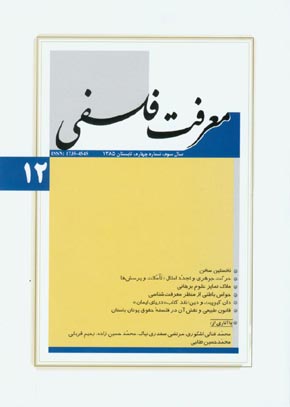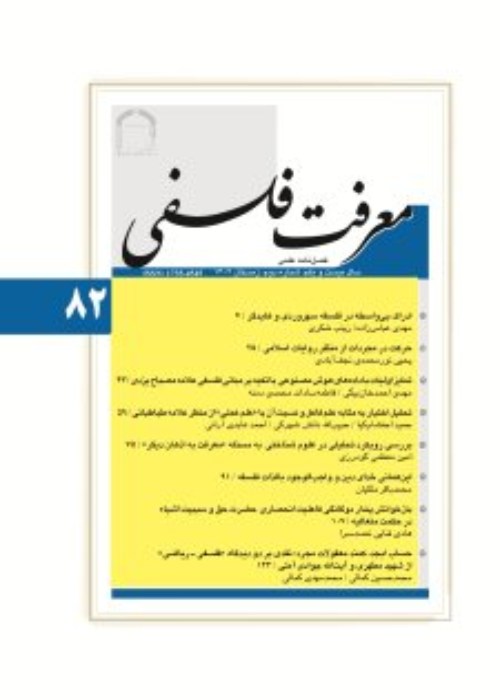فهرست مطالب

فصلنامه معرفت فلسفی
سال سوم شماره 4 (پیاپی 12، تابستان 1385)
- 176 صفحه، بهای روی جلد: 6,000ريال
- تاریخ انتشار: 1385/07/18
- تعداد عناوین: 7
-
صفحه 7
-
صفحه 11صدرالدین شیرازی با طرح نظریه حرکت جوهری، بحث حرکت در فلسفه را به ساحت مابعدالطبیعی بسیار عمیقتری از آنچه در گذشته بوده است، میرساند. وی نه به ادراک حسی از حرکات سطحی قناعت میکند و نه به ذوق عارفانه و شاعرانه بسنده مینماید، بلکه بر مبنای یک هستیشناسی اصالهالوجودی با براهین گوناگون حرکت عام و بنیادین عالم مادی را اثبات میکند و بر پایه آن، برای بسیاری از مسائل پیچیده فلسفی پاسخهای راهگشایی عرضه میکند. نوشتار حاضر، حاصل تاملاتی پیرامون این نظریه و تدقیق در براهین و نتایج آن است. نتیجه این تاملات، طرح ملاحظات و پرسشهایی است که امید است اعتنا به آنها، در تعمیق و پیشبرد این بحث سودمند واقع شود.
کلیدواژگان: حرکت جوهری، قوه و فعل، موضوع حرکت، حرکت اعراض، اصالت وجود، تشخیص، غایت داری، تجدد امثال -
صفحه 45یکی از مسائلی که به تناسب در علوم گوناگون، مورد بحث قرار گرفته بررسی تمایز علوم از یکدیگر است که چه ملاکی دارد و چگونه علوم از یکدیگر متمایز میگردد؟ در این مقاله، سعی شده این مطلب اثبات گردد که ملاک تمایز علوم برهانی به موضوعات آنهاست و در این علوم، فقط از اعراض ذاتی موضوع بحث میشود. برای اثبات این مطلب، ابتدا توضیحی در مورد برهان آمده و بیان شده که «برهان» قیاسی است منتج یقین، و به همین مناسبت، درباره «حقیقت یقین» توضیحاتی داده شده و سپس در خصوص اعراض ذاتی مطالبی ارائه گردیده است. در نهایت، این مطلب مطرح شده که علوم برهانی دارای وحدت حقیقی است. بحثی درباره توصیفی یا توصی های بودن علوم پایان بخش مقاله است.
کلیدواژگان: علوم برهانی، اعراض ذاتی، یقین، وحدت حقیقی -
صفحه 65گرچه بررسی حواس باطنی از منظر معرفتشناسی کمتر مورد توجه قرار گرفته است و تفکیک میان ساحت معرفتشناختی و وجودشناختی آنها مشکل به نظر میرسد، اما در میان انبوه مباحث، میتوان مطالبی یافت که صبغه معرفتشناختی دارند. این نوشتار پس از تعریف «حس باطنی» و طبقهبندی آن، نگاهی گذرا به «حس مشترک» و خزانه آن، و «خیال» و قلمرو و کارکردهای آنها دارد و ادراک خیالی (تخیل) را از ابعاد و ساحتهای گوناگون، به ویژه از بعد خطاپذیری و خطاناپذیری، بررسی کرده است. در ادامه، به حافظه، قلمرو، کارکردها و ویژگی های آن میپردازد و اعتبار آن را ارزیابی میکند. به نظر میرسد حافظه مولد معرفت یقینی نیست، بلکه راه یا ابزاری ثانوی است که معرفتها را حفظ و نگهداری میکند و با یادآوری، آنها را در عرصه ذهن حاضر میسازد. هرگاه کوچکترین تردیدی نسبت به نتایجی که در ذهن داریم حاصل شود، میتوان استدلالهای آنها را مرور و ارزیابی کرد و در نتیجه، معرفت یقینی خود را تثبیت نمود. اگر صرفآ به حافظه استناد گردد و تنها بدان اکتفا شود، نمیتوان از خطا ایمن بود.
کلیدواژگان: ادراک خیالی، حس مشترک، حافظه، حضوری بودن تخیل، خطاپذیری حافظه، قلمرو و کارکردهای حواس باطنی -
صفحه 109دان کیوپیت، که خود کشیشی ژورنالیست است، نظراتی افراطی درباره اعتماد کامل بر علم داشته و بر اساس آن، معرفتبخشی دین و آموزه های آن را انکار میکند. وی در این بررسی ها، دچار تناقضگویی ها، مغالطهکاری ها و بیانصافی های فراوانی شده، به گونهای که دین را افسانه و اسطورهمعرفی کرده و همه آموزه های آن را در ردیف تعالیم خرافی جادو و طلسمات دانسته و علیرغم توجه انحصاری وی به دین مسیح، همه نتایج بررسی میان علم و مسیحیت را بر همه ادیان، حتی اسلام، تعمیم داده است. اما تقریبآ همه رویکردهای وی نسبت به دین و رابطه آن با علم، به طور اساسی در معرض انتقاد اساسی قرار دارد. نوشتار حاضر بررسی انتقادی دیدگاه های وی به شمار میرود.
کلیدواژگان: دین، دنیاگرایی، خدا، ایمان، سرنوشت دین، مغالطات تعمیمی -
صفحه 131آموزه «قانون طبیعی» در حوزه تفکر بشر، دارای سابقهای دیرینه است. این آموزه مشتمل بر گستره پهناوری از نظریه هاست که از زمان تمدن یونان باستان، در حوزه های علوم اجتماعی نقش محوری ایفا کرده است. با وجود اینکه آموزه «قانون طبیعی» در خلال قرنهای متمادی به گونه هایی متفاوت تفسیر شده است، اما همه این قرائتها در چند اصل ثابت اتفاقنظر دارند: این اصول واقعیاند، نه اعتباری؛ وابسته به طبیعت جهان یا طبیعت بشرند؛ در ذات خود مبانی عقلی برای قواعد اخلاقی محسوب میشوند و میتوانند بنیاد همه شاخه های علوم اجتماعی قرار گیرند.
قانون طبیعی با قانون بشری تفاوت بسیار دارد؛ قانون زندگی است که طبیعت بشر یا طبیعت جهان آن را الهام میکند. نظریه های مربوط به «قانون طبیعی» به دو دسته سنتی و جدید تقسیم میشوند: نظریه های سنتی مشتمل بر سه دوره طولانی است: دوره یونان باستان، دوره روم باستان و دوره مسیحیت (قرون میانه).
این نوشتار به شرح مختصری درباره «قانون طبیعی» در دوره یونان باستان همراه با ذکر نکاتی انتقادی نسبت به آن میپردازد.
کلیدواژگان: قانون طبیعی، طبیعت، پیش سقراطیان، عدالت، سوفسطائیان، فیلسوفان یونان باستان
-
Page 7
-
Page 11By suggesting the theory of substantive motion, Ṣadr al-Din Shīrāzi deepens the issue of motion to metaphysical depths, very further than what was once imagined in the past. He stops neither at the sense perception of apparent motions, nor at mystical and poetic tastes. He rather establishes the universal and fundamental motion of the material world through a variety of arguments on the basis of an ontology marked by the essentiality of existence. Then he presents helpful answers to many complex philosophical questions.This article is the result of some reflections on this theory and some scrutiny about its arguments and results. The outcome of these reflections is some remarks and questions that the author hopes taking them into consideration may help philosophers in deepening and advancing the issue further.
-
Page 45The issue of differentiation between various branches of knowledge and its criteria are discussed in a variety of academic disciplines. This article suggests that the differentiation between different theorematical disciplines is determined on the basis of their subject matters, and these disciplines study solely the essential accidents of their subject matters. To establish this issue, the author defines a theorem as a syllogism that culminates in certainty. Then he explains about the reality of certainty, and makes some clarifications about essential accidents. And he claims a real unity among theorematical disciplines. The article ends with a discussion on the descriptive or normative nature of sciences.
-
Page 65Esoteric senses are rarely discussed from an epistemological perspective, and hence the difficulty of discrimination between their ontological aspect from their epistemological one. However, one can find epistemological material amongst what is said in this regard. The author in this article begins with a definition and classification of the "esoteric senses", and has an overview on "common sense" and its repertory, and the domain and functions of "fantasy". Then he examines different aspects of "imagination" as a cognitive faculty, especially its errency and inerrancy. In the second part, the author discusses about memory, its domain, its functions, its quality, and the reliability of its outcome. He thinks that memory produces no certain knowledge, but it is a secondary way or instrument for preserving knowledge. It reproduces knowledge in the mind by recalling them. Whenever there is a slightest doubt about our conclusions in our mind, we can review and assess their arguments, and hence, reaffirm their accuracy. A mere reliance on memory is not immune from erring.
-
Page 109Dun Q Pite, as a journalist and a priest, has radical ideas about the reliability of science, and on this ground rejects the cognitive character of religion and its teachings. In his studies, he runs into lots of contradictions, commits fallacies, and forgets about academic fairness. He talks about religion as a kind of mythology, and introduces religious teachings as some sort of magic and spell. Despite the fact that his studies are merely focused on Christianity, but he unjustifiably generalizes the results to all religions, including Islam. Almost all his approaches and theories about religion and its relation to science are fundamentally criticized. This article is an example of such critical approaches to his writings.
-
Page 131The doctrine of natural law has a long history in the realm of human thinking. It comprises a wide range of theses and has played a central role in different fields of social studies from the time of ancient Greek. In spite of various interpretations of natural law during many centuries, there have been common and constant principles on which all such theories have been based: 1.These principles are objective, not subjective. 2.They depend on the nature of the universe or mankind.3.They are, in themselves, recognized as rational foundations for moral judgments and can be the bases of all social studies disciplines.Natural law is far from anything we conceive as man-made. It is considered to be a rule of life given by human nature or the nature of the universe. Natural law theories are classified into ‘traditional’ and ‘modern’ ones. The former is divided into three large groups: Classical, Roman, and Christian (middle ages) traditions. This article briefly examines natural law theory in its traditionally classical version.
-
ABSTRACTSPage 4


